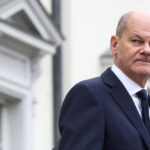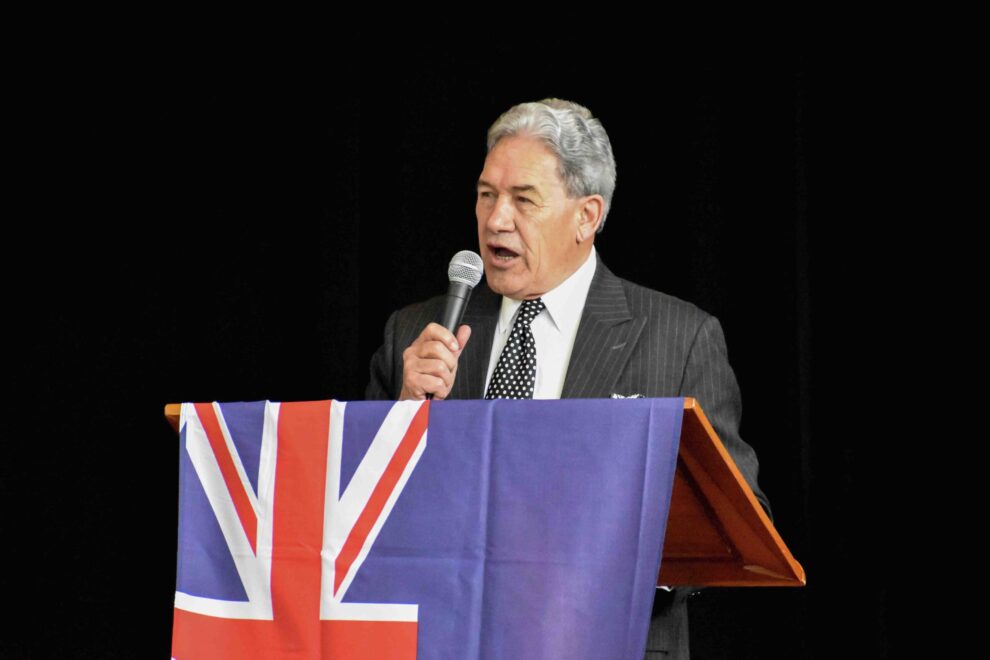There may be major changes ahead for New Zealand’s foreign policy, Geoffrey Miller writes.
New Zealand’s international relations are under new management and Winston Peters, the new foreign minister, is already setting a change agenda.
As expected, this includes a more pro-United States positioning when it comes to the Pacific — where Peters will be picking up where he left off. Peters sought to align New Zealand more closely with the US under his Pacific Reset policy that he launched while serving as foreign minister under Jacinda Ardern’s Labour-New Zealand First coalition government from 2017-2020.
Peters is wasting no time in getting back on the foreign affairs horse.
Just three days after being sworn in as a minster, he gave his first speech on foreign policy at the US Business Summit in Auckland. Peters was lavish in his praise for the US in his address, arguing that Washington had been “instrumental in the Pacific’s success”.
But he noted “there is more to do and not a moment to lose. We will not achieve our shared ambitions if we allow time to drift”, adding that “speed and intensity” would be needed.
Peters said “the good news is that New Zealand stands ready to play its part”.
The early timing of the speech itself is a sign that New Zealand’s new, yet very familiar, foreign affairs minister is unlikely to wait around when it comes to taking major decisions.
It was an important, agenda-setting address. There were strong hints the new government wants to move swiftly when it comes to Wellington’s potential involvement in Pillar II of the Aukus defence pact that involves Australia, the United Kingdom and the US.
Peters disclosed in the Q&A to the speech that he had already talked to Judith Collins, the new defence minister, about New Zealand’s Aukus stance.
The previous Labour government’s position was that Aukus remained a hypothetical question while no formal offer existed for New Zealand to join Pillar II of the defence pact..
But while playing for time in an election year, the then prime minister Chris Hipkins signalled in July that New Zealand was at least “open to conversations” about joining the pact in some form. And Labour’s expedited release of three major defence strategy documents in August, just prior to the election campaign, laid the groundwork for at least formal consideration of involvement in Aukus.
The reports also paved the way for New Zealand to spend vastly more on its military and to take a more security-focused approach to the Pacific — recommendations that Peters will probably be keen to implement.
Wellington and Washington have been becoming closer since at least November 2010, when US Secretary of State Hillary Clinton visited New Zealand’s capital to sign the Wellington Declaration.
The relatively short agreement served to clear the air after decades of chequered bilateral relations stemming from the fourth Labour government’s introduction of a nuclear-free policy in the 1980s.
Going nuclear-free (which prevented visits from US warships) resulted in New Zealand being cast out as a US ally. Washington formally suspended its obligations to Wellington under the Anzus defence treaty in 1986. But nearly 40 years on, US-NZ relations are rapidly deepening, a trend that has been accelerated by Russia’s invasion of Ukraine and Western concerns over China’s rise in the Indo-Pacific.
Since February 2022, New Zealand has imposed sanctions on Russia, joined US-led groupings such as Partners in the Blue Pacific (PBP) and the Indo-Pacific Economic Framework (IPEF) and sent its prime ministers to successive Nato summits. And in May 2022, Ardern visited Joe Biden at the White House, where a 3000-word joint statement called for “new resolve and closer co-operation”.
Meanwhile, a string of senior US officials have visited New Zealand just this year, including Secretary of State Antony Blinken, assistant secretary of state Daniel Kritenbrink and the White House’s Indo-Pacific co-ordinator, Kurt Campbell (who Biden recently nominated to become his new deputy secretary of state).
If New Zealand does join Aukus, it could spell the effective end of the country’s independent foreign policy.
The Anzus break-up of the late 1980s, the end of the Cold War and the acceleration of globalisation had allowed New Zealand to free itself from blocs.
Wellington talked to anyone and everyone, building solid, trade-focused relations with China and others in the Global South — while not neglecting Western partners, including the US.
Peters may think the current geopolitical environment justifies a new approach.
If he does, he should prepare for significant push-back. Helen Clark, who was prime minister during Winston Peters’ first term as foreign minister from 2005-8, recently posted that New Zealand was now “veering towards signing up” to Aukus despite bipartisan support over decades for the independent foreign policy stance.
This added to criticism from Clark earlier in the year, including in August, when she argued the new defence blueprint showed New Zealand was “abandoning its capacity to think for itself and instead is cutting and pasting from Five Eyes partners”.
It should also be remembered that Peters, while undoubtedly powerful and highly experienced, is only one minister.
The views of Defence Minister Collins remain unknown in any detail, while the foreign policy positions of Christopher Luxon seem more centrist than radical.
Moreover, with the US now firmly focused on the war between Hamas and Israel — and its own presidential election year fast approaching — it is far from guaranteed that the hypothetical Aukus question will turn into a concrete one for New Zealand anytime soon.
Moreover, Peters’ initial ministerial comments on New Zealand’s own position towards the Middle East suggest there is plenty of room for nuance.
Calling the death toll in Gaza “horrific”, Peters called for all parties to “work urgently towards a long-term ceasefire”.
Talking to all sides and playing a small role in facilitating a sustainable political solution to the Israeli-Palestinian conflict would very much be in keeping with New Zealand’s independent foreign policy approach — and Peters is already speaking out strongly about the war.
With Luxon passing up on the opportunity to attend COP28 in Dubai, Peters will have the chance to make the government’s first ministerial trip to the Middle East to begin this dialogue. The Gulf states would be a natural starting point for these discussions.
Meanwhile, on Ukraine — the war that helped to speed up New Zealand’s alignment with the US in 2022 — Peters was open to the idea of New Zealand upgrading its military support to Ukraine by sending Kyiv light armoured vehicles (LAVs).
While noting that the decision was not up to him alone, he added “if we can help we should be doing the best we can”.
Labour had denied a request from Ukraine to provide the LAVs in 2022 and of late had preferred to make financial contributions to Kyiv’s war effort — the most recent being a $NZ4.7 million package announced by Hipkins in July at the Nato leaders’ summit in Lithuania.
It all adds up to a complex picture.
Peters has no shortage of global issues to address.
And there could be some major changes ahead for New Zealand foreign policy.
Source : Otago Daily Times















